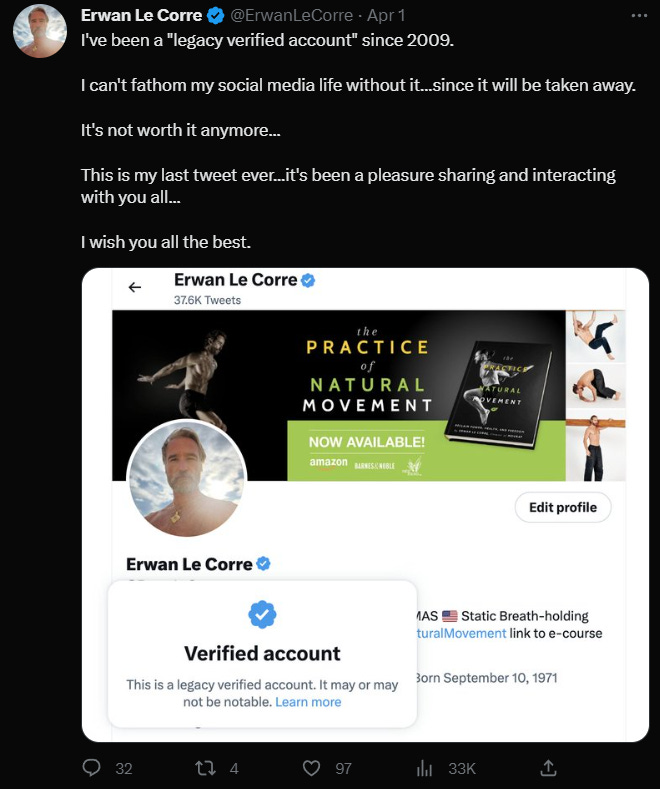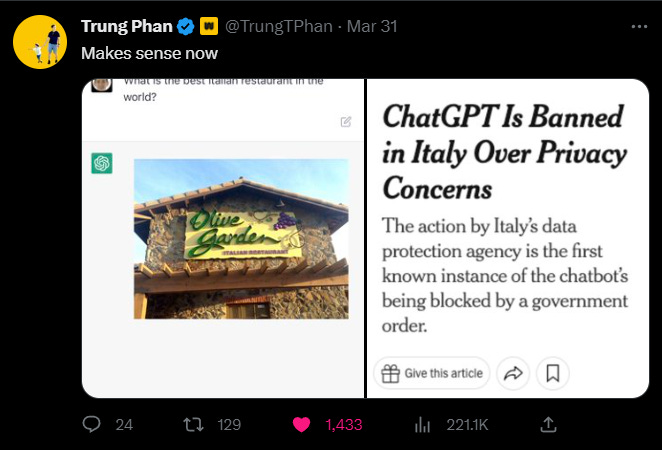M&Ms: The Attention Economy
The curious disappearance of the celebrity in the 100th edition.
Hey Team,
Twitter is forcing everyone to pay $8 a month to be verified and keep their reach.
I am active on Twitter and gladly pay for the extra boost in reach I get from verifying my identity there.
But LeBron James said he wouldn't pay.
The NY Times said they wouldn't pay, and tons of other famous and legacy-verified accounts (celebrities and notable people) said they won't. On the surface, it seems Twitter is making a colossal mistake, potentially losing all these celebrities.
Nathan Hubbard, a former media person from Twitter, thinks that pushing away celebrities will end the platform. His Thread has 13.9 million impressions as of this writing:
And Nathan makes some good points in that thread. He and his team spent years courting celebrities to come onto Twitter. And if you search for tweets with more than a few thousand likes, retweets, or engagements before 2018, you will find that almost all the viral content on Twitter came from celebrities. So just a few years ago, celebrities were critical to Twitter’s success.
But a lot has changed, and asking Nathan, a media person who deals with celebrities all the time, if celebrities are important is like asking your barber if you need a haircut. There is only one answer. And I hope it’s not lost on Nathan that even he, who isn’t a celebrity, was somehow able to reach almost 14 million people.
Something started changing after 2019 or so on Twitter.
Random people started going viral on Twitter and other social platforms. Attention became decentralized. The creator economy started to take off. Influencers became a thing, YouTube and Mr. Beast. And TikTok started to become massive.
The problem became so pronounced that the Kardashians started losing engagement on their most robust social platform, Instagram. And they complied loudly to FaceBook and Zuckerberg.
In August 2022, Ben Thompson wrote an excellent article titled "The Three Trends" on the rise of the TikTokifiication of all social networks. In it, he quoted a former FB executive who said the Algorithms are killing the Kardashians' reach.
But the Algorithms are just giving the people what they want. After all, the goal of the recently open-sourced Twitter Algorithm is to "maximize unregretted minutes" on the platform.
Viewed from another lens, all of this makes sense.
Warren Buffet talks about how unique investing in newspaper businesses used to be before the internet. Buffet used to own several newspapers at Berkshire Hathaway. Buffet said, "owning a local newspaper had such a powerful moat that you could put your idiot nephew in charge as the CEO, and it would still be a smashing success. He couldn't mess it up, basically."
In a Berkshire Hathaway meeting in the 90s, Warren Buffet explained why this all changed:
"Every human on this planet has two eyes, two ears, and 24 hours a day. Nobody has more than that."
So when the internet came around and drew attention away from newspapers, it was apparent that the print newspaper business would never recover or grow again. Where would the attention come from if it was being split with the internet now? No matter how hard the idiot nephew tried to preserve the print newspaper business, he couldn't.
What happened to the newspaper is exactly what's happening to celebrities, sports stars, and every big name in the attention game right now. Even the History Channel must now compete with The Cultural Tutor.
All of media is being chopped up and decentralized.
People have a finite amount of attention to give in a 24-hour period.
If all these Twitter Threads from randoms, such as myself, are getting a million impressions, and I have been lucky enough to have a few of those Tweets, all of that is eating away attention from some celebrity somewhere.
The thing is, I am a nobody, and for me to siphon away attention from celebrities is nuts. But that's the world we live in now. If the content is useful, then people will consume it.
The tools are available to anyone, and the big players have no advantage anymore, and you, too, can jump in and share your ideas.
But it's not just me; many other "nobodies" regularly go viral on Twitter because their content is good. Their content educates, entertains, or inspires. And their content is doing more for other people these days than the Kardashian Sex Tapes ever did.
Of course, celebrities, sports stars, and other famous people are still important and have massive reach, but they are nowhere near as important as they used to be.
If they were, the algorithms would cater to them, but they don't.
Twitter says they will charge everyone $8 because the bots and AI-generated content will flood the platform soon. And maybe there is some truth to that.
But Twitter is charging everyone that because they don't care if the celebrities leave anymore.
The attention economy is now fully democratized; even you and I have a chance.
Five Tweets: Loss Aversion, Legacy, GPT Fears, Immigration, and America
J.D. wrote a nice thread on this, saying this is all about loss aversion.
And I do agree to some degree many of these celebrities and legacy verified accounts are rebelling at their loss of importance.
But this is a gradual shift, and people have not been paying attention to the fact that almost anyone with a phone and an internet connection can now siphon insane amounts of attention from the world.
There has never been a better time for you to jump in and share your ideas.
Regular people have never had more advantages than they do today.
The misfortunes on Twitter are coming from a lot of people.
Unfortunately, I think it makes no sense to fight this.
A fascinating Tweet by the Maestro on ChatGPT; I think there are some crazy fears around AI right now.
Most of it is unfounded.
This a wonderful thread by Armand. Showcasing that most of what we have to learn is not from celebrities.
I am a huge believer that Immigration is what makes America Special.
Bucco points to something important in the below tweet.
Recently, America’s haters are celebrating because we’ve got our fair share of problems:
But in my opinion, as an immigrant to America that’s seen the other side and even lived under communism for a little, there is nothing special about those places that are celebrating.
America might have its problems, but at least it’s a special place.
Immigrants come here from all over the world, are afforded tons of opportunities, and can make a huge impact on its trajectory.
None of those places Bucco is calling out work like that. Not even the place I was born works like that.
But America does.
That’s why it will always be hard for America’s enemies to win, even if they are cunning.
Two Memes: ChatGPT banned in Italy, Chess.com CEO
The AI fears overtook Italy, which banned ChatGPT entirely.
On a serious note, it seems crazy to me to ban such an important technology so early on.
This is no different than banning the early personal P.C.
And again highlights an important factor of what makes America (where ChatGPT was invented) such a special place. America is tolerant.
Another great Tweet from Bucco, this time on a job posting for the Chess.com CEO.
Note: this post by Bucco, an anonymous account, has 2.3 million impressions numbers that even the celebs would be salivating for.
Things are just no longer the same.
My friend Ankur got a million impressions on this Meme.
Proving both that attention is fully decentralized, AND that Zoom meetings are draining people.
As always, thank you for reading.
-Louie
P.S. you can reply to this email; it will get to me, and I will read it even if I cant always reply in a timely manner.














At one point in article.. looked like I was reading a professional journalist.. I was so into it.. excellent read to me
I agree with you, Louie that right now, we have now reached the age of algorithmic everyone based on the Sam Lessin's excellent observation Digital Attention Food Chain in Progress at https://twitter.com/lessin/status/1551931628305502208
However, if you think about it, asking everyone to pay the 8 dollars and giving different treatment in terms of reach, depending on whether you paid or not, ... isn't this a bit like how the ISPs wanted to have different treatment of bandwidth which the net neutrality movement was against?
How is the same mechanic suddenly different when you move up the OSI stack?
I also may be using the wrong analogy here. So I stand corrected if that's the case.
I don't have an answer to my own questions. I totally get that twitter needs to make more money. I don't want twitter to go away.
I am unsure if this execution is right. No judgement on anyone who pays (or doesn't) for the blue checkmark.